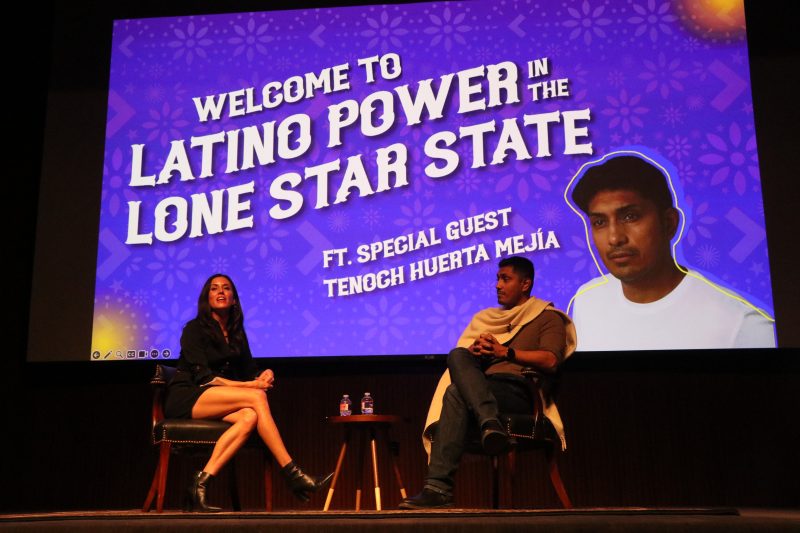Mexican Actor Says Latinos Can Change Texas Politics If They Vote
By Katrina L. Spencer
Reporting Texas

President of NextGen America Cristina Tzintzún Ramirez, left, and actor Tenoch Huerta Mejía discuss the Latino vote at the LBJ Auditorium at the University of Texas at Austin Monday. Katrina L. Spencer/Reporting Texas
Latinos in Texas have the power to change the state’s political landscape if they vote in greater numbers, Mexican actor Tenoch Huerta Mejía told a group of about 200 Central Texas residents Monday.
“Somos un chingo,” Huerta Mejía said, referencing the fact that Latinos are a large part of the Texas electorate.
Huerta Mejía, who starred in the movie “Black Panther: Wakanda Forever,” was invited to speak on the University of Texas at Austin campus by NextGen America, an organization working to promote progressive public policy and increase voter turnout. Cristina Tzintzún Ramirez, the group’s president, moderated the event, “Latino Power in the Lone Star State.”
Antonio Arellano, vice president of communications for NextGen America, said more needs to be invested in the Latino community.
“If you don’t invest in mobilizing, educating, empowering a community, you can’t expect them to show up. It’s not rocket science,” Arellano said.
In addition to his acting career, Huerta Mejía is known for his political engagement and activism, as seen in his 2022 book “Orgullo Prieto,” which speaks of a need for antiracist values in Latino culture.
Of the more than 29 million people in Texas, over 11 million are of Hispanic or Latino origin, according to the 2020 U.S. Census. As of 2022, 32% of eligible voters in Texas are Latino, according to the Pew Research Center. However, not all Latinos who are eligible are registered to vote, and some who are eligible to do so do not vote.
NextGen America aims to mobilize voters aged 18 to 35, Arellano said, and Texas is one of the organization’s priority states.
“Tonight is all about the Latino electorate and the power of young Latinos in the state to create transformative change,” Arellano said. “We’re having a conversation about the power that they hold and how they can wield it to make the change that they seek.”
Tzintzún Ramirez, a UT graduate and 2020 candidate for the U.S. Senate, set the stage with data that described the Latino condition in Texas.
“Every two and a half days a construction worker dies in our state, the majority of who are Latino,” she said. “Even though we make up the largest ethnic majority, we are the least likely to have health care. We are the least likely to graduate college and the most likely to be poor in this state. We are not given the respect that we deserve.”
Southern Methodist University political science professor Cal Jillson told Reporting Texas in an interview that Latino voters’ priorities are “the same as everybody else,” listing the economy, education and health care.
“Rights and dignity,” he added, were additional concerns to this voting group, referencing the treatment many immigrants face when crossing the border. Latino voters in Texas are intolerant of “harsh” or “cavalier” treatment of people when entering the United States, he said.
“Hispanics vote 2-to-1 Democrat,” Jillson said. “Mexicans and Latin Americans lean Democrat,” but he noted that Cubans and some Venezuelans are more likely to vote Republican.
Political science professor Mark P. Jones of Rice University said that “getting eligible folks to move towards citizenship” could be an effective method for increasing voter registration and voter turnout for Latinos in Texas. Unlike Blacks and college-educated whites who tend to vote Democratic, he said, the “Latino electorate is very diverse” and “less wedded to one party or the other.”
Huerta Mejía, mirroring his role in Wakanda Forever, said that Blacks and Latino people must work together as “we are bleeding from the same wound.”
“Go and vote,” Huerta Mejía said. “Conquer the right to be happy.”